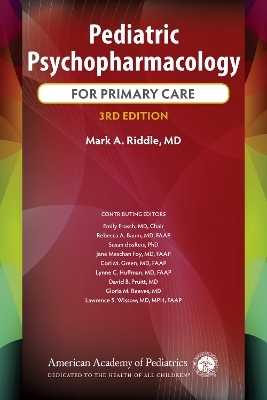
Pediatric Psychopharmacology for Primary Care
American Academy of Pediatrics (Verlag)
978-1-61002-546-1 (ISBN)
Completely updated and revised, the third edition provides primary care physicians with practice-tested, condition-specific treatment recommendations for various childhood mental disorders. Obtain clear guidance on dosing, monitoring, and potential adverse reactions of psychotropic medications for treatment of common psychiatric disorders and mental health or behavioral problems in children and adolescents.
It includes digital tools offering instant access to additional information on psychotropic medications.
TOPICS INCLUDE
Conceptual framework for prescribing psychotropics
Newly approved medications, changes in regulations and guidelines, and updates in the professional literature are included in this new edition
Medications for specific diagnoses—ADHD, anxiety, and depression
Food and Drug Administration approved antipsychotics and mood stabilizers and all other medications
What to do when treatment is unsuccessful
Mark A. Riddle, MD, is a Professor of Psychiatry and Pediatrics at the Johns Hopkins University School of Medicine. His clinical work involves collaborating with primary care clinicians in a federally qualified health center and providing phone consultations to primary care clinicians. The focus of Dr Riddle’s research, teaching, and clinical practice is pediatric psychopharmacology, especially medication side effects. His publications include over 300 research articles, reviews, chapters, and edited volumes. He serves as a member of the NICHD-sponsored Data Monitoring Committee for the Best Pharmaceuticals for Children Act and as Chair of the Scientific Council of the NVLD Project. He was a member of the Institute of Medicine’s Committee on Review of Pediatric Studies Conducted Under the Best Pharmaceuticals for Children Act and the Pediatric Research Equity Act, and the principal investigator of an NIMH-sponsored, multisite study of interventions for children who have gained weight on antipsychotic medication, and the site-PI of a 6-year follow-up study of preschoolers who were treated with medication for ADHD. He was the Director of the Division of Child and Adolescent Psychiatry at Johns Hopkins from 1993-2009 and was the founding chair of the Interventions Review Committee for Disorders Involving Children and Their Families at the National Institute of Mental Health. Rebecca Baum, MD, FAAP is a developmental behavioral pediatrician at The Olson Huff Center at Mission Children’s Hospital in Asheville, NC. She has led several clinical, educational, research, and quality improvement efforts at the state and national levels focused on improving care for children with behavioral health conditions. She is a consultant to the American Board of Pediatrics Foundation’s Behavioral/Mental Health Crisis efforts and chair of the American Board of Pediatrics’ subboard of Developmental Behavioral Pediatrics. She is a member of the American Academy of Pediatrics’ Committee on Psychosocial Aspects of Child and Family Health and liaison to the Section on Developmental Behavioral Pediatrics. Jane Meschan Foy, MD, FAAP, has spent more than 35 years in pediatric primary care, public health, administration, and medical teaching. Her special interests include mental health services in pediatric primary care and school settings, access to health care for underserved populations, primary care of children with special health care needs, and residency training in mental health, community pediatrics, and advocacy.Dr Foy received her bachelor of arts from Wellesley College and her doctorate of medicine from University of North Carolina at Chapel Hill School of Medicine. She completed her residency training in pediatrics at University of North Carolina hospitals. She has held several academic positions and is currently professor of pediatrics at Wake Forest University School of Medicine and medical director of the Northwest Community Care Network (a regional network of North Carolina Medicaid providers). She is active in the American Academy of Pediatrics (AAP), having served as chair of the AAP Task Force on Mental Health from 2004 to 2010 and currently serving as past chair of the AAP National Committee on Psychosocial Aspects of Child and Family Health; member of the AAP Mental Health Leadership Work Group, and member of the AAP Board of Directors. Roles in other organizations have included the presidency of the North Carolina Pediatric Society (North Carolina Chapter of the AAP) from 1998 to 2000 and cofounder and director of the School Health Alliance for Forsyth County from 1999 to 2011. Cori Green, MD, MS, FAAP is Director of Behavioral Health Education and Integration in pediatrics and an Associate Professor of Clinical Pediatrics at New York Presbyterian/Weill Cornell Medicine. Her clinical and research focus is the integration of pediatric mental health care into pediatric care and she has received grant funding and published in this field. She is a faculty member for Project TEACH and the REACH Institute where she trains pediatric providers to integrate mental health into primary care. Dr Green is part of several of the American Academy of Pediatrics mental health initiatives as a member of Mental Health Leadership Workgroup. She also consults for the American Board of Pediatrics.
Preface
Chapter 1. Getting Started
Chapter 2. Conceptual Framework for Prescribing Psychotropic Medications
Chapter 3. Making a Diagnosis
Chapter 4. Before Prescribing
Chapter 5. Group 1 Medications for Attention Deficit/Hyperactivity Disorder
Chapter 6. Group 1 Medications for Anxiety and Depression
Chapter 7. Group 2 Medications: Antipsychotics and Mood Stabilizers
Chapter 8. Group 3 Medications
Chapter 9. Fine Tuning Treatment
Chapter 10. What To Do When Treatment Is Not Successful
| Erscheinungsdatum | 29.11.2021 |
|---|---|
| Mitarbeit |
Berater: Emily Frosch, Rebecca A. Baum, Susan DosReis, Jane Meschan Foy |
| Verlagsort | Elk Grove Village |
| Sprache | englisch |
| Maße | 152 x 229 mm |
| Gewicht | 420 g |
| Themenwelt | Medizin / Pharmazie ► Gesundheitswesen |
| Medizin / Pharmazie ► Medizinische Fachgebiete ► Pädiatrie | |
| Medizin / Pharmazie ► Pflege ► Kinderkrankenpflege | |
| ISBN-10 | 1-61002-546-6 / 1610025466 |
| ISBN-13 | 978-1-61002-546-1 / 9781610025461 |
| Zustand | Neuware |
| Haben Sie eine Frage zum Produkt? |
aus dem Bereich


